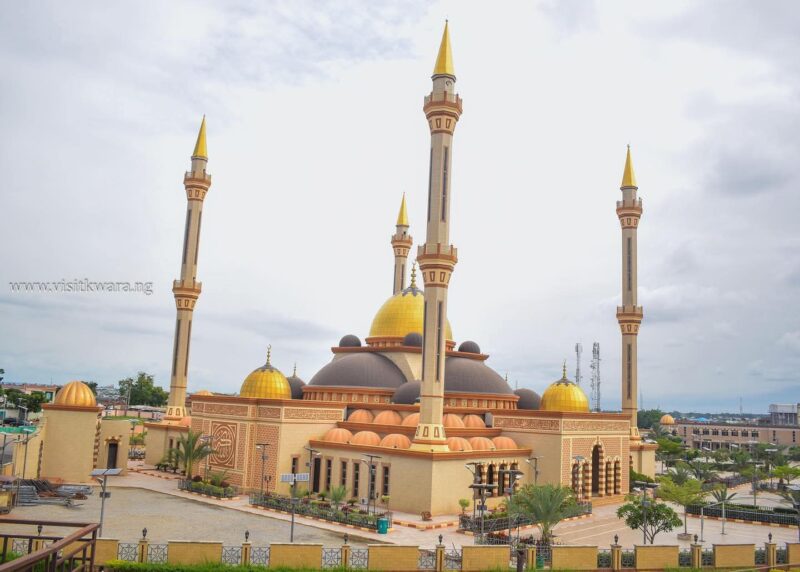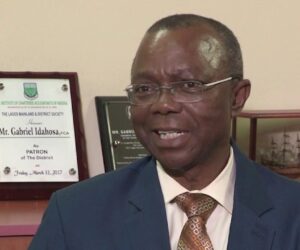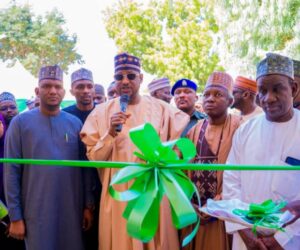For years, the magnificent Ilorin Central Jumaat Mosque has been one of the city’s greatest symbols of faith, beauty, and identity.
With its shining domes and alluring calligraphy, the mosque stands as a proud landmark of Islamic heritage in the Ilorin Emirate.
But behind the glamour, the mosque’s management has quietly battled the challenge of keeping it running.
SPONSOR AD
Each month, the maintenance cost for the architectural masterpiece hovered around five million naira on electricity, cleaning, and general upkeep.
The amount is so huge that it often leaves the management struggling to meet expenses. For a long time, contributions from worshippers during Friday prayers and the modest monthly donations from the five local governments within the Ilorin Emirate barely made a difference.
However, after years of struggling to make its maintenance a success story, a lifeline has arrived from one of Nigeria’s most influential businessmen, Alhaji Aliko Dangote, the president of Dangote Group.
Dangote’s decision to build a 250-bed hostel at the University of Ilorin as a source of income for the mosque has brought a wave of relief and excitement across the city.
Symbol of Faith, Pride
The Ilorin Central Mosque is more than just a place of worship. It is the spiritual and cultural heart of the Ilorin Emirate that showcases its religious identity and heritage. Built in 1981 at a cost of about N2.5 million, the edifice underwent a major transformation in 2013 when it was remodelled into a world-class structure costing about N2.5 billion. The renovation gave it a modern design with artistic Islamic inscriptions and calligraphy imported from 16 different countries according to its handlers.
The project, spearheaded during the tenure of former Senate President Bukola Saraki as governor of Kwara State who gathered individual billionaires, top companies and establishment to chart a defining religious cause.
The move not only projected the mosque as a national and international symbol, it turned it into a major tourist attraction for Muslims from Nigeria and beyond.
Since then, the mosque has stood as an architectural masterpiece and a unifying symbol for the people of Ilorin, drawing thousands of worshippers every week and visitors who come to admire its beauty.
But maintaining such a massive structure soon became a serious challenge.
Maintenance Burden
Every Friday, thousands of worshippers congregate in the mosque for the Jumu’at mosque. But for the management committee, each passing week also comes with the stress of keeping the facility functional.
The chairman of the mosque’s management committee, Alhaji Shehu AbdulGafar, said maintenance costs had been the biggest headache since the mosque was reopened after its remodelling in 2013.
“Running the mosque takes about five million naira every month. We get small contributions from worshippers during Jumaat prayers and N200,000 each from the five local governments in the Ilorin Emirate. But that is still far below what is needed”, he explained.
“Electricity bills alone consume about N1.5 million monthly. The committee also pays for water, cleaning, staff stipends, and other routine expenses. For years, the team relied on fundraising and donations from kind-hearted individuals. But those efforts were no longer enough”, Gafar, a former Secretary to the government, said.
Faced with rising costs and dwindling donations, the mosque’s management decided that it was time to find a lasting solution. Instead of depending entirely on public contributions, the committee proposed an investment that could generate income regularly.
After careful discussions, they settled on the idea of constructing a 250-bed hostel for students at the University of Ilorin. The plan was to build, own, and manage the hostel for 21 years. The revenue from students’ rent would then be used for the maintenance and upkeep of the mosque.
The idea was sound, but there was one major problem, funding. The estimated cost of the project was about N1.1 billion, far beyond the reach of the committee.
Enters Dangote’s Olive Branch
It was at this point that help came from an unexpected but familiar source. The management committee reached out to Alhaji Aliko Dangote, one of Nigeria’s most respected philanthropists and industrialists, to support the project.
After reviewing the proposal, Dangote agreed not only to fund the construction of the entire hostel but also to provide a monthly donation of N5 million to help the mosque with its running costs until the project is completed.
For many in Ilorin, this gesture represents more than just philanthropy. It is a reflection of shared faith, compassion, and the deep respect the billionaire has for the spiritual and cultural identity of Ilorin.
According to Alhaji AbdulGafar, a Memorandum of Understanding (MoU) has already been signed with the University of Ilorin, and land has been allocated within the campus. Once completed, the hostel will be managed by the mosque for two decades before ownership reverts to the university.
“The project will give the mosque financial independence and ensure that future generations do not go through the same struggle,” he said.
A welcome initiative
The University of Ilorin, for its part, welcomed the development with open arms.
The Vice Chancellor, Professor Wahab Egbewole, who signed the MoU on behalf of the university, said the project would help reduce the accommodation challenges faced by students.
“With our growing student population, we are constantly in need of more hostel facilities. This initiative will help us meet that need while supporting a noble cause,” he said.
He praised the Ilorin Central Mosque management for their creativity and commitment to self-sufficiency, describing the project as “a win-win for both the university and the community.”
A Practical Act of Faith
For the mosque’s legal adviser, Professor Yusuf Olaolu Ali (SAN), the initiative reflects a new model of community-driven sustainability. He described the hostel plan as a “practical act of faith” that balances religious devotion with economic foresight.
“In today’s Nigeria, the government alone cannot meet the needs of students in tertiary institutions. When well-meaning individuals and institutions take up such projects, they not only solve social problems but also promote values of compassion and service,” he said.
He called on other wealthy Nigerians to emulate Dangote’s example by using their resources to support projects that benefit society and strengthen Islamic institutions.
Solar Energy Transformation
Beyond Dangote’s contribution, another positive development came from Senator Saliu Mustapha, the Turaki of Ilorin, who has provided a solar power installation for the mosque.
Before this intervention, the mosque relied heavily on power supply from the Ibadan Electricity Distribution Company (IBEDC), spending up to N1.5 million monthly for just a few hours of electricity.
The new solar project, according to Alhaji AbdulGafar, will drastically cut down power expenses and provide constant electricity, ensuring that the mosque remains illuminated throughout the night.
“This project will not only reduce our costs but will also beautify the mosque at night. People coming into Ilorin will see the mosque glowing from afar,” he said.
The management of the mosque expressed deep gratitude to Dangote, Senator Mustapha, and all those who have supported the mosque’s projects.
“We appreciate their generosity and vision. Their contributions will forever remain part of the mosque’s history and the development of the Ilorin Emirate”, Gafar said.
The Emir of Ilorin, Alhaji Ibrahim Sulu-Gambari, who has been at the forefront of efforts to sustain the mosque, was also commended for his guidance and leadership.
Many residents have described the developments as a turning point, saying the projects will not only sustain the mosque but also serve as a model for how faith-based organisations can manage themselves responsibly.
The Muslim Media Watch Group of Nigeria also hailed the gestures as noble and worthy of emulation. Its National Coordinator, Alhaji Abdullahi Ibrahim, described Dangote’s action as “a practical show of faith and compassion.”
He called on other wealthy Muslims to follow the example of contributing to religious and humanitarian causes instead of focusing on extravagant spending.
“Such gestures reflect true belief in Allah,” he said. “They show how wealth can be used to serve humanity and support the faith. We hope others will take inspiration from this.”
He also praised the Emir of Ilorin for appointing capable hands to manage the mosque, noting that the leadership under Alhaji AbdulGafar had brought fresh ideas and accountability.
A New Chapter
For the people of Ilorin, the support from Dangote and other benefactors is more than just a donation; it is a renewal of hope. It shows that even in challenging times, partnerships between faith and philanthropy can bring lasting solutions.
The upcoming hostel project, combined with the solar energy installation, is expected to put the mosque on a path of financial stability. It will ensure that the iconic edifice continues to serve generations of Muslims as a place of worship, learning, and community gathering.
The Ilorin Central Mosque has always been more than a building. It represents the soul of a city deeply rooted in Islam and tradition. From its towering minarets to its golden interiors, it reflects the collective faith and identity of a people.
Now, as it enters a new phase of sustainability, the mosque is again setting an example, this time not just in beauty, but in innovation and responsible leadership.







